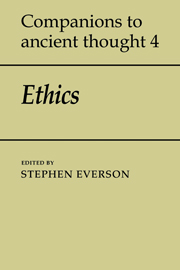Book contents
- Frontmatter
- Contents
- 1 Introduction: virtue and morality
- 2 Pre-Platonic ethics
- 3 Platonic ethics
- 4 Aristotle on nature and value
- 5 Some issues in Aristotle's moral psychology
- 6 The inferential foundations of Epicurean ethics
- 7 Socratic paradox and Stoic theory
- 8 Doing without objective values: ancient and modern strategies
- 9 Moral responsibility: Aristotle and after
- Bibliography
- Index of names
- Index of passages discussed
- Index of subjects
6 - The inferential foundations of Epicurean ethics
Published online by Cambridge University Press: 05 June 2012
- Frontmatter
- Contents
- 1 Introduction: virtue and morality
- 2 Pre-Platonic ethics
- 3 Platonic ethics
- 4 Aristotle on nature and value
- 5 Some issues in Aristotle's moral psychology
- 6 The inferential foundations of Epicurean ethics
- 7 Socratic paradox and Stoic theory
- 8 Doing without objective values: ancient and modern strategies
- 9 Moral responsibility: Aristotle and after
- Bibliography
- Index of names
- Index of passages discussed
- Index of subjects
Summary
An outline of Epicurean ethics
Pleasure, according to Epicurus, is the single positive value, or ‘end’, towards whose attainment and maximisation all human and animal life is geared. An ideal Epicurean life gains its distinctive flavour from an orchestrated set of calculations aimed at that result, balancing in particular the relative contributions of bodily and mental pleasures, and, within those categories, of two distinct types, ‘kinetic’ and ‘katastematic’ pleasures. Bodily feeling is in a way focal, since mental pleasure and pain consist ultimately in satisfaction and dissatisfaction respectively about bodily feeling. For instance, the greatest mental pain, fear, is primarily the expectation of future bodily pain (which is the main ground, and a mistaken one, for the fear of death). And the greatest mental pleasure lies in confidence that bodily pain can continue indefinitely to be avoided or overcome. But although mental feelings ultimately depend on bodily ones, and not vice versa, mental feelings are a more powerful factor in the overall quality of a life. Someone in bodily pain – which may be unavoidable – can outweigh it by the mental act of reliving past pleasures and anticipating future ones. It is this ability to range over past and future that gives mental feeling its greater power. But misused, especially when people fear everlasting torture after death, it can equally well become a greater evil than its bodily counterpart.
Katastematic pleasure is the absence of pain.
- Type
- Chapter
- Information
- Ethics , pp. 129 - 150Publisher: Cambridge University PressPrint publication year: 1998
- 6
- Cited by

